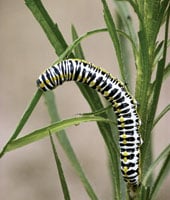Advertisement
Say Goodbye to Unwanted Garden Guests
The beans are climbing, the pumpkins are filling out, and the roses are in full bloom. But what’s this? Insect interlopers? Gardeners need a supply of remedies in case unwelcome guests get out of hand. Before heading off to the garden centre, though, look to your pantry for solutions. Organic gardeners have long used home-made … Continued


The beans are climbing, the pumpkins are filling out, and the roses are in full bloom. But what’s this? Insect interlopers? Gardeners need a supply of remedies in case unwelcome guests get out of hand. Before heading off to the garden centre, though, look to your pantry for solutions.
Organic gardeners have long used home-made preparations to ward off unwanted insects and diseases. Here is a list of must-have ingredients, all available at your local health store, for all gardeners to use in the garden safely.
1. Garlic
Few pests and diseases attack garlic plants. Garlic is full of compounds including allicin, geraniol, and linalool which are natural insecticides. Garlic also contains sulphur, a natural fungicide. A crushed garlic spray can help control aphids and other soft-bodied insects as well as diseases such as powdery mildew. However, because garlic spray can also kill the good guys, including ladybugs, hover (or syrphid) flies, and lacewings, target only the area affected by unwanted pests.
2. Milk
In 1999, a Brazilian scientist discovered that when he sprayed milk onto cucumber plants that were previously infected with powdery mildew, the disease was arrested and the plants recovered. The good news for gardeners is that any kind of milk works, from full fat to skim and even powdered. Although the original study found that a 50-percent solution of milk (one part milk to one part water) was the most effective, even rates of 10 percent controlled the disease. Three treatments, five to seven days apart, were all that was required.
3. Beer
Slugs and snails are some of the most difficult garden pests to control since they only come out at night. Instead of hand-picking these garden pests, let them walk (or slime) their way into their own traps. Both slugs and snails are attracted to the smell of beer. Pour one inch of beer into a margarine or yogourt container, and place these traps around the garden. Within a few days, the containers will be full of drowned mollusks, which can then be safely disposed of.
4. Vinegar
Controlling weeds can be a daunting task for the organic gardener. Household vinegar contains approximately five percent acetic acid and can be used to control weeds, especially those that come up around sidewalks or pathways. Try to choose a hot, sunny day before applying household vinegar. For even better results, pickling vinegar, which is closer to 20-
percent acetic acid, can be used. However, be careful not to spray this across the garden as it can burn both weed and garden plants. Instead, spot spray or paint-brush it onto weeds.
5. Baking Soda
Many rose lovers can attest to the damage that diseases such as black spot or powdery mildew can have on their beloved plants. Cornell University researchers found that when roses were sprayed with baking soda every three to four days, both black spot and powdery mildew came under control. The recommended rate is to mix 1 Tbsp (15 mL) of baking soda in 4 cups (1 L) of water with 1/2 teaspoon (2.5 mL) of dish soap.
Garlic Spray
Here is a standard recipe for using garlic in the garden.
3 oz (85 g) of garlic
1 tsp (5 mL) mineral oil
1 tsp (5 mL) liquid dish soap
Soak minced garlic in mineral oil for 25 hours. Strain out the garlic and add 2 2/3 cups (600 mL) water and the liquid dish soap. Mix thoroughly. Spray plants with a solution of 1 to 2 Tbsp (15-30 mL) of garlic oil mixture in 2 2/3 cups (600 mL) water. The dish soap allows the spray to adhere to the leaves.




